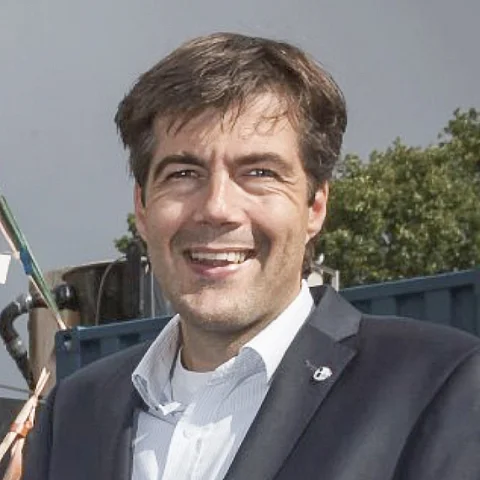Paques Biomaterials Creates Truly Biodegradable Bioplastic from Wastewater
30-10-2024
Bacteria in wastewater naturally produce bioplastic that can fully break down in nature through the same bacteria. The Frisian company Paques Biomaterials aims to take over the market for alternatives to fossil-based plastics with this innovation.
The first demonstration plant, a world-first, opened in Dordrecht in May last year. It’s the only factory making this type of fully biodegradable plastic. Unlike other so-called biodegradable plastics that need six months at 65 degrees Celsius in an industrial composting plant to break down, Paques' bioplastic decomposes naturally. It’s also distinct from bioplastics derived from trees or biomass, which sometimes displace food crops.
Advantages without the Drawbacks
For Joost F. Paques, director of Paques Biomaterials, the plant marks a milestone after over a decade of research, process acceleration, and scaling with partners like TU Delft. Since 2010, they’ve worked on producing PHA (polyhydroxyalkanoate) from bacteria, a natural polymer used as a plastic alternative. “It’s not plastic, but a plastic-like alternative, hence we call it bioplastic. It’s as light, flexible, strong, and versatile as traditional plastic, but without the drawbacks of fossil plastics,” says Paques.

The greatest advantage is biodegradability—bacteria that produce PHA can also break it down in nature, making it “super biodegradable” in soil, oceans, or compost facilities.
Bacterial Fat
PHA is made by naturally occurring bacteria. "Like humans, these bacteria store energy reserves from organic material they consume. If we eat too much, we store it as body fat. Bacteria do the same, except they store PHA, a type of bacterial fat,” Paques explains. TU Delft discovered that large amounts of PHA could be extracted from bacteria, given sufficient organic material, like the substances found in wastewater. This led to the first demo plant near HVC in Dordrecht, where treatment sludge is processed. Other sources could include organic wastewater from paper mills, breweries, confectioneries, chemical plants, restaurants, or supermarkets.
Agricultural Applications
The uses for natural, biodegradable bioplastic are extensive, but the product still needs market uptake. “It’s especially interesting for sectors where biodegradability is a major benefit, such as agriculture and horticulture,” says Paques. These industries face stricter EU regulations that will soon ban plastics that leave microplastics in the soil. For instance, some fertilizers contain plastic coatings, which will be banned in 2026, prompting producers to seek alternatives like PHA. Fruit labels that currently use plastic-based adhesives could also be replaced by PHA. Paques Biomaterials is in discussions with various companies, including Foamplant, which supplies fully biodegradable foam to the horticultural sector, and Maan Biobased Products, which sells millions of plant pots that are currently difficult to remove from the ground. With PHA, this would no longer be an issue. Additionally, the company Basilisk intends to use bioplastic in its self-healing concrete, where bacteria convert PHA into limestone to fill cracks, thus preventing corrosion.
Factory Development
In May 2022, the company opened its first demo factory with a consortium of water boards and research institutes at HVC in Dordrecht, a project costing 4.5 million euros. Here, bacteria are cultivated to produce PHA polymers from treatment sludge, currently producing 25 kilos of bioplastic daily. Paques Biomaterials plans to sell its first full-scale plant that extracts PHA from wastewater to customers later this year. Additionally, the company intends to build an extraction facility that isolates PHA from bacteria to make bioplastic. This demo factory is being constructed in Emmen and will be operational next year. A larger commercial plant is also planned for 2026 on the same site, expected to produce 6,000 tons of bioplastic annually and cost tens of millions of euros. The company has held multiple investment rounds to fund these projects. “The technology is ready and proven. Now, scaling up is the challenge,” says Paques.
Independent Growth
Paques Biomaterials emerged from its partner company, Paques, which has been building wastewater treatment installations since the 1980s. Although biogas is often produced in these processes, PHA polymers are a more valuable product. Bacteria cultivation can be handled at treatment plants, but the chemical process to extract PHA for use in plastic is best conducted elsewhere. Since Paques was sold to German company Skion in 2020, the polymer division has continued independently as Paques Biomaterials.
Green Chemistry Accelerator
Paques Biomaterials recently received support from the Green Chemistry Accelerator, a program by the platform Groene Chemie Nieuwe Economie (GCNE), Invest-NL, and the Dutch Regional Development Agencies (ROMs). Experts help green chemistry startups create customized plans to achieve major goals within a hundred days. This tailored support accelerates funding for pilot and demo plants. Five startups, including Paques Biomaterials, complete the program with a meeting at Change Inc. in Amsterdam on February 16. Other participating startups are Relement, ETB Global, Susphos, and Torwash—all promising game changers for green chemistry.
Networking and Focus
Participation in the program provides Paques Biomaterials with two key benefits, according to Paques. “We have a strong network in water treatment technology, but chemical extraction is a different world for us. Through this program, we’ve found a network in green chemistry,” he says. “An accelerator is meant to speed things up, and the program has helped us focus on making faster progress within the company.”
This article was previously published on Change Inc as part of a campaign in collaboration with Groene Chemie, Nieuwe Economie, and was written by editor André Oerlemans.
[Read the full series on our site or at Change Inc.]
